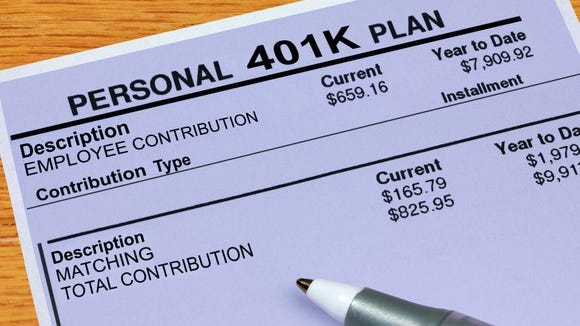How To Get 401k From Old Job
Do you know where your money is? If you changed jobs in the last decade, you may be among the millions who accidentally and unknowingly abandoned a 401(k). Time to retrieve it and take control. But how?

Americans lost track of more than $7.7 billion in retirement savings in 2015, according to the National Association of Unclaimed Property Administrators. If you've lost an account, don't feel bad. Some folks just need to drop everything and rush out the door when quitting a job. Others are distracted by a move or swept up in transition. Most folks' 401(k)s aren't at the same bank or brokerage they use for other accounts. And many don't manage the investments in their plan directly. When it comes to nest eggs, out of sight often means out of mind.
More:Follow USA TODAY Money & Tech on Facebook
More:6 ways to measure if your retirement plan is on track
More:Sales of bulletproof backpacks surge after Florida shooting, but how effective are they?
But good news: that money is still yours! It may be with your old employer, or maybe it's in an IRA. If your money was invested, it should still be growing.
But leaving old plans with old employers can have downsides. Fees could be high. Investments made years ago could be very wrong for today. There could be inefficient overlap with your other accounts.
Scattered accounts are also inconvenient. Managing or living off your retirement savings is easier if it's all in one place. And once you retire, tracking down multiple accounts and analyzing which ones to tap is a hassle.
So track them down now. Contact old employers to see if you left funds behind. And check old statements for contact information. There are also websites that can help. To find your old employer's current contact information, try this website. Check the Labor Department to see if your old plan was terminated. A former employer may even be trying to reunite you with your money, so look at this website to see.
Once you've found everything, it's time to consolidate. You generally have two options: Roll old plans into one IRA or maybe you roll them into your current 401(k) and take advantage of options in that plan.
Which is right for you? Depends. If your employer's plan has reasonable fees and uses an investment adviser held to the government's fiduciary standard, a 401(k) merger could make the most sense, and that's especially true if your company gives you access to investment professionals who can help you make smart decisions. Staying on track for retirement goals can be difficult without a financial coach. If that coach is a fiduciary, they're legally required to put your interests first.
If you already have a trustworthy financial adviser, the IRA rollover approach may be best. Some 401(k)s have limited investment options. Some, sadly, lack good service and support. Rolling your old accounts to an IRA can give you a broader range of investment choices. But beware when seeking advice. Some brokers and non-fiduciaries encourage rollovers, then prod you to buy pricey and inappropriate funds that pay them over-the-top commissions. Worse, they may peddle you an annuity. Annuities in IRAs or 401(k)s are beyond senseless because they are tax-deferred, so the annuity's tax shelter is redundant. That's on top of the ubiquitous nasty problems with variable and index annuities.
Whatever you decide, the next step is contacting the companies managing your old 401(k)s. They'll tell you how to move the money. Carefully follow their instructions. Some firms do this plan-to-plan — seamless! If they send you a check, get the funds into a retirement account within 60 days — otherwise you could incur tax penalties.
And that's it. When everything is merged, you can work on your own or with your adviser to make sure the money is invested right for your goals and needs.
Tracking down misplaced savings takes some work. But it's worth it. Everything will be centralized. You'll likely save money on fees. It all will work toward your ultimate retirement goals. You will soon thank yourself.
Ken Fisher is the founder and executive chairman of Fisher Investments, author of 11 books, four of which were "New York Times" bestsellers, and is No. 200 on the Forbes 400 list of richest Americans. Follow him on Twitter @KennethLFisher
The views and opinions expressed in this column are the author's and do not necessarily reflect those of USA TODAY.
How To Get 401k From Old Job
Source: https://www.usatoday.com/story/money/columnist/2018/02/25/left-your-401-k-old-job-heres-how-find/366891002/
Posted by: cisnerosthatten.blogspot.com

0 Response to "How To Get 401k From Old Job"
Post a Comment